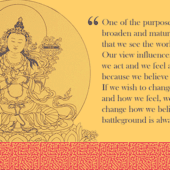Mindfulness: a distinct mental factor that repeatedly brings to mind a phenomenon of previous acquaintance without forgetting it. It doesn’t allow the mind to be distracted from the object and is the basis for concentration.
Here you will find the Buddhist philosophy of mind and awareness, or lorig (Tib.). Topics include the divisions of the selfless, types of cognizers and the classification of objects; the division of mind into primary minds and mental factors; an explanation of virtuous and afflictive mental factors; how to identify our afflictions in daily life and apply antidotes; and how to cultivate positive states of mind that fuel our spiritual progress.
Teachings highlighted in bold are listed at the bottom of the page.
Who it’s for
This series of teachings provides an in-depth map of the Buddhist understanding of the mind and its functions. It provides not only a philosophical layout of the divisions of mind and awareness but also practical instructions on how to use this understanding to cultivate positive states of mind and free ourselves from destructive ones.
Content and resources
Venerable Thubten Chodron gave two extensive commentaries on mind and awareness.
The first set of teachings was a commentary on Geshe Jampel Sampel’s text Presentation of Mind and Awareness, Composite of All the Important Points, Opener of the Eye of New Intelligence: A Presentation of Mind and Awareness (2012-13).
This series covers topics such as:
- Divisions of the selfless
- Classification of objects
- Object possessors and the seven types of cognizers
Separately, Venerable Chodron taught extensively on mind and mental factors, the sautantrika tenet system presentation of the mind and its functions: Mind and Mental Factors (Teachings 1995-96)
This 25-part series includes topics such as:
- Primary minds and mental factors
- Omnipresent mental factors
- Virtuous mental factors
- Afflictive mental factors
- Mind training
- Antidotes to the afflictions
Venerable Chodron also taught a more concise (4-part) presentation of mind and mental factors at a retreat in Singapore: Creating the Causes of Happiness Retreat (Singapore 2014).
An outline of the 51 mental factors and their definitions can be accessed here.
In 2019, Venerable Sangye Khadro gave an overview of mind and awareness during the weekly Thursday evening Course in Buddhist Reasoning and Debate (2017-19). Her teachings from this longer series can be accessed at:
- Seven Kinds of Awareness with Venerable Sangye Khadro (2019)
- Mind and Mental Factors with Venerable Sangye Khadro (2019).
Consideration for others: a distinct mental factor that avoids negativity for the sake of others. It enables us to restrain from harmful physical, verbal, and mental actions, acts as the basis for maintaining pure ethical conduct, prevents others from losing faith in us, and causes joy to arise in others’ minds.
Related Series

Course in Buddhist Reasoning and Debate (2017-19)
Teachings on The Course in Buddhist Reasoning and Debate: An Asian Approach to Analytical Thinking Drawn from Indian and Tibetan Sources ...
View Series
Creating the Causes of Happiness Retreat (Singapore 2014)
Teachings given during a two-day retreat organized by Buddhist Fellowship and held at Poh Ming Tse Temple.
View Series
Mind and Awareness (2012-13)
Teachings on "Presentation of Mind and Awareness" by Geshe Jampel Samphel.
View Series
Mind and Mental Factors (1995-96)
Teachings on Buddhist psychology given at Dharma Friendship Foundation in Seattle.
View Series
Mind and Mental Factors with Venerable Sangye Khadro (2019)
An overview of the Buddhist psychology of mind and mental factors given during a course on Buddhist reasoning and debate in 2019.
View Series
Seven Kinds of Awareness with Venerable Sangye Khadro (2019)
An overview of the seven kinds of awareness according to the Buddhist philosophy of mind taught as part of a course on Buddhist reasoning...
View Series
Mind and Awareness
Teachings on the Buddhist philosophy of mind and awareness, or lorig.